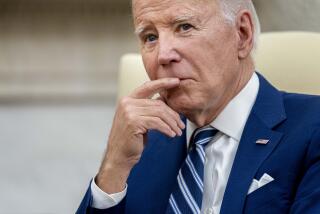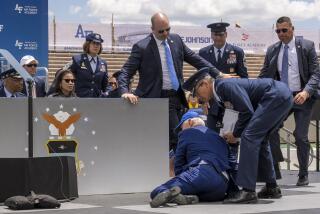Reformists Target China’s Aging Leaders : Premier Zhao Assails ‘Rigid Thinking’ of Senior Party Members
- Share via
BEIJING — Under the leadership of Premier Zhao Ziyang, the reform wing of the Chinese Communist Party has launched a concerted drive to counteract the influence of aging orthodox Marxists in the party leadership.
At a party meeting last week, Zhao, who since January has also held the job of acting party general secretary, attacked what he called “rigid thinking” within the party.
“The problem of having too many elderly people in leading positions has not been fully overcome,” he added.
It was the first time that the premier has openly criticized the group of senior party leaders, many of them in their 80s, who have dominated Chinese political life since the ouster of former Party Secretary Hu Yaobang last January.
Reform, Prosperity Linked
Zhao and his allies have also begun to hammer away at the theme that reforming China’s socialist economy has brought prosperity and that a doctrinaire, ideological approach will threaten that prosperity.
“Poor socialism will have no vitality,” the newspaper Economic Daily said recently.
The premier’s efforts appear to enjoy the backing of Chinese leader Deng Xiaoping. Last week, Deng told a visiting official from Singapore that China had suffered from “leftist errors” throughout the two-decade period from 1957 to 1978 and that the result had been stagnation.
One Western diplomat said he believes that Zhao is trying hard to persuade party leaders of the importance of proceeding with China’s market-oriented economic reforms. In the wake of Hu’s resignation, a number of economic changes, such as a further lifting of price controls and the issuance of stock shares, have been postponed.
“Zhao’s remarks can be read as a plea to those in the party who want to turn the clock back that it really can’t be done,” this analyst said. “You know, the 1950s may have been a golden age in China, but they’re gone, and China is falling further and further behind the developed countries.”
Foreign analysts also viewed Zhao’s efforts as new evidence of the intense jockeying for power and accompanying ideological debate in the top ranks of the Chinese Communist Party.
A full-scale party congress, the first one in five years, is scheduled this fall, and the party is expected to name a permanent general secretary and a new Politburo, central committee and secretariat at that time.
Leaves for European Trip
On Wednesday, just before departing for a swing through Eastern Europe, Zhao announced that he was leaving two leaders of the reform wing of the Communist Party in charge of the party and government while he is out of the country for the next 18 days.
He said that Vice Premier Wan Li will serve as acting premier and that Politburo member Hu Qili will preside over the party secretariat, the body that runs the party’s day-to-day affairs.
Last January, after an outbreak of student demonstrations for Western-style democracy in Chinese cities, conservative elders in the Communist Party initiated a campaign to rid the party of the influence of what they called “bourgeois liberalization.”
Hu was forced to resign, and since then the party has been insisting on strict adherence to Marxist orthodoxy in the fields of education, journalism, science, art and literature, and other aspects of intellectual and cultural life.
Deng went along with these political changes, which were believed to have strong support not only in the conservative wing of the Communist Party but also in the People’s Liberation Army and China’s security apparatus. Zhao, too, gave public support to the drive against “bourgeois” influences.
Spreading to Economy
But in recent weeks, Chinese reformers allied with Zhao have warned that the ideological campaign was improperly spreading into economic policy. For example, they said, some unnamed officials have been trying to argue that China’s eight-year-old policy of allowing peasants to cultivate their own plots rather than working in communes is a form of capitalism.
The renewed focus on economic issues has put the orthodox Marxists on the defensive. It has raised fears among peasants and lower-level party officials that the material advances of the past decade might be brought to a halt.
Last month, while visiting an impoverished section of China, one of the conservative officials spearheading the campaign against bourgeois liberalization was forced to reassure local cadres that despite the recent political changes, China’s economic advances will continue.
According to the official New China News Agency, Peng Zhen, chairman of the Standing Committee of the National People’s Congress, was traveling through Jiangxi province when “some Red Army veterans told him some people were worried” about possible changes in economic policy.
“Our general policy of enabling the people to prosper will not change, and it must not be changed,” Peng answered. “As for some specific policies, minor adjustments will be made in the light of actual conditions.”
Zhao’s attack on aging party leaders and on “rigid thinking” was made last week during what will probably be the only formal meeting of high-ranking party leaders before the party congress is held next fall.
The meeting was called to declare an end to the Communist Party’s “rectification campaign”--the effort begun in 1983 to purge errant cadres from the ranks of the 44-million-member party. At this session, the internal divisions within the Communist Party leadership were brought into the open.
Chinese newspapers gave roughly equal prominence to two separate speeches to the meeting. One was by Zhao. The other was by Bo Yibo, 80, vice chairman of the rectification drive, one of the elderly leaders who has been in the forefront of the drive for Marxist orthodoxy.
Bo emphasized the importance of ideological purity within the party. Over the past few years, he said, “leaders of many units paid attention to the economy and their professions while neglecting ideology, working style, discipline and organization.”
He also complained that the party’s 1983 drive against “spiritual pollution”--a code phrase for Western influences--had been stopped.
By contrast, Zhao stressed the importance of economic reform and de-emphasized ideology. He repeatedly called upon party leaders to demonstrate “flexibility.”
“We cannot give up reforms, opening to the outside world and invigoration of the economy and return to the closed working conditions of the past, just as one cannot go hungry because one once choked on food,” the premier was reported to have said.
Zhao, who is 68, also urged other Communist Party leaders to uphold “our achievements in selecting young cadres, discarding the life-long leadership system and adopting a retirement system.”
Bo, by contrast, did not mention the age issue.
More to Read
Sign up for Essential California
The most important California stories and recommendations in your inbox every morning.
You may occasionally receive promotional content from the Los Angeles Times.













